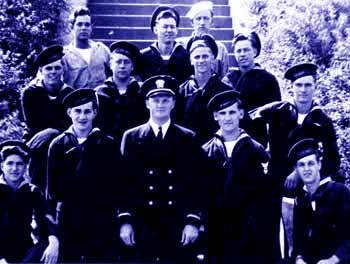Roland E. Goss was born in Texas in 1920. He was raised in Dallas where his father was a police officer whose most famous case involved the pursuit of the notorious bank robbers Bonnie Parker and Clyde Barrow in 1934. Growing up, Roland was heavily involved in athletics. In high school he was a three-sports star, excelling in football, basketball, and track. Following high school, he was offered football scholarships at Baylor University, Texas Tech, and Southern Methodist University (SMU), among others. He accepted a full scholarship at SMU and became the second member of his family to attend college.
Despite occasional injuries, Goss was as successful on the football field at SMU as he had been in high school. He earned the nickname “Stormy” because of his habit of “storming” all over the football field during games. During his senior year, the NFL Philadelphia Eagles notified him that he would be drafted if he was interested in playing professional football. However, fate intervened because he played his last college football game on December 6, 1941, the day before the Japanese attack on the American Pacific fleet at Pearl Harbor.
I can remember the day before the Pearl Harbor attack. I was playing a game against Rice University. That was my last football game for SMU. My whole life changed after that.1
Along with most of his teammates, Goss immediately signed up for military service. His roommate joined the Army Air Corps but Goss chose to join the Navy because that branch of the service would allow him to finish his last semester of college. He would be able to earn his business degree before reporting for active duty. For the Navy, the patina of accomplishment that accompanied a college degree was an important component of what it meant to be an “officer and a gentleman” so they were willing to wait four months before calling him up.
Following graduation from SMU in the summer of 1942, Goss went to Chicago to attend midshipman's school where, as one of thousands of “90-day wonders,” he earned his commission and became an ensign in the U.S. Navy. He was then sent to Little Creek, Virginia for training on “amphibious” boats. These boats were the landing craft (LCs) that were being developed for the purpose of landing troops and materiel during invasions of enemy territory from the sea. At Little Creek fifteen sailors were assigned to him as members of his crew.

Goss and his sailors (1944)
Next, he and his sailors were sent to Florida for advanced training. During this period he met some “frogmen” whose mission was to surreptitiously swim to enemy shores for the purposes of reconnaissance and demolition. Several of his frogmen friends urged him to join their unit and he was tempted until he considered the five-mile swim these men would routinely make in order to get to shore. He decided to remain the skipper of his amphibious boats.
After his training in Florida, Goss and his men were sent to New York where they embarked for England. On the beaches of southern England, they continued their amphibious training. There were several types of amphibious craft. The largest was the LST (Landing Ship-Tanks) that was designed to transport either tanks or a large number of men. LCTs (Landing Craft-Tanks) were smaller and could carry a few tanks. Goss and his men were assigned to LCMs (Landing Craft-Mechanized) that could transport either one tank or sixty soldiers.
Mom , Pop, don't worry about me because I'm sure I will come through this okay.
For several months during the spring of 1944, Goss and his sailors practiced landing their three LCMs in preparation for the long-anticipated invasion of Europe that was to take place on the coast of France at Normandy. The date for the invasion (in military parlance, “D-Day”) was to be June 6, 1944. On June 5, during the night before the invasion, Goss and his men were to take their boats and, as part of the largest armada in history, cross from Plymouth, England to Normandy a distance of approximately ninety miles. He wrote his parents on June 5:
With all the protection we have I don’t believe that we will have too much trouble—Well, I’ll know pretty soon anyway—We are all in good spirits, joking, and are very anxious to get it over . . . No one seems nervous or excited—we are very confident that everything will come off okay. Of course, I could be mistaken and the Germans may give us a heck of a licking, but I don’t believe they will. Mom, Pop, don’t worry about me because I’m sure I will come through this okay—But if I don’t, I don’t want you taking it too hard—I want you to be proud of me—hold your head in the air and be proud—But I’m coming back—you can count on that.2
